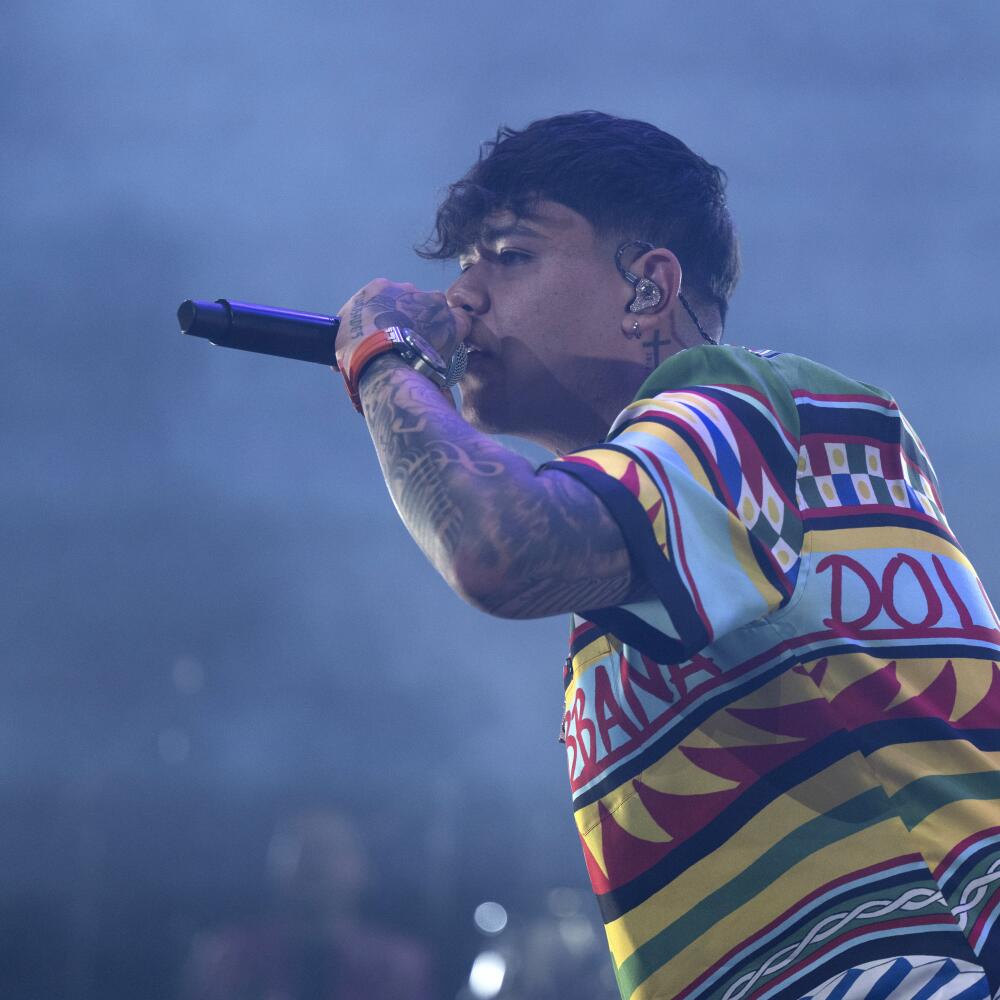
Last December, Junior H promised his concert attendees at the Microsoft (now Peacock) Theater that he would return to Los Angeles to perform at a bigger venue.
The 23-year-old Mexican regional artist, whose real name is Antonio Herrera, made good on his promise Friday night in front of a sold-out crowd at Crypto.com Arena. The show kicked off Junior H’s headlining “Sad Boyz Tour,” a 19-city run that will take him across the U.S. Southwest, the Pacific Northwest, Alabama and Georgia.
Sky-high heels, gold chains and shots of tequila were just some of the things we saw at the the Fuerza Regida concert.
“Esta noche estamos cumpliendo un sueño, estamos en Los Ángeles, en la casa de los Lakers,” he told the crowd. .
The show clocked in at less than two hours, with a set list that included the upbeat “Fin De Semana” and “Mente Positiva,” as well as sadboi favorites “Dias Nublados,” “Abcdario” and “Luna.”
The Mexican regional group from Northern California drew the sad paisas in Los Angeles and beyond to Crypto.Com Arena
Halfway through the set, Jimmy Humilde, founder and chief executive of independent label Rancho Humilde, walked onstage. Rocking a Fernando Valenzuela jersey — the Dodgers had retired the Mexican pitcher’s number that same night — Humilde presented his young artist with nine platinum and two diamond record plaques.
“No hay muchos mexicanos haciendo lo que este c— esta haciendo,” said Humilde.
Though a longtime staple in parts of the United States, Mexican regional music has exploded in popularity in recent years. Junior H, and label mates Natanael Cano and Fuerza Regida, Peso Pluma and Yahritza y Su Esencia belong to a new wave of bicultural artists who have adapted the genre for a millennial and Gen Z audience on both sides of the border and across the globe. Several of them are U.S.-born, or have spent their formative years here. Although, Junior H was born in Mexico but lived in Utah as a teenager.
For fans, Fernando Cuahuizo and Jaime Valencia, the mainstreaming of corridos tumbados has been personally validating.
“I feel like in high school, when I listened to them, a lot of people used to make fun of corridos tumbados,” said Cuahuizo.
“People always thought it was never going to catch on,” said Valencia, who added that the genre had “[blown] up overnight, basically.”
The two friends made the three-hour trek from Cathedral City, Calif., to celebrate Cuahizo’s birthday.
“We got tickets the same hour they were announced,” Cuahuizo said. “We were actually hiding at work trying to buy them.”
Omar Valenzuela, another fan in attendance, said watching Junior H perform at such a prominent U.S. arena felt like a cultural milestone.
“I love it for the Mexican culture, you know, not only for Mexicans but all Latinos,” he said. “I believe we deserve more recognition for our work.”
Among the hits Junior H performed that night was “Picardía,” his collaboration with Rauw Alejandro. The track is yet another example of the ongoing trend of Mexican regional acts teaming up with their reggaeton counterparts to make music. Other examples include Grupo Frontera and Bad Bunny; Ivan Cornejo and Jhayco; and Grupo Firme and Maluma.
“I’m glad he did a song with a Puerto Rican artist,” said Jacquelin Ramirez, who attended the show with her husband, Cesar Cruz. “Picardía,” she added, was her favorite Junior H song.
As the night wound down, before going into his closer, “Se Amerita,” a song about letting the good times roll, Junior H ended his show with a pledge.
“Como se los prometí la ultima vez, el siguente año en el siguente evento que nos vemos [sera] en un lugar más grande todavia!” he yelled into the mic.
His next L.A. show, he promised, will be bigger.
More to Read
The Latinx experience chronicled
Get the Latinx Files newsletter for stories that capture the multitudes within our communities.
You may occasionally receive promotional content from the Los Angeles Times.









